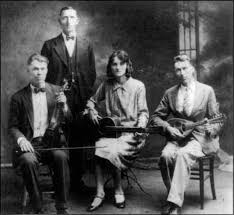Annotation:New Hot Times: Difference between revisions
No edit summary |
No edit summary |
||
| Line 10: | Line 10: | ||
<div style="text-align:justify;"> | <div style="text-align:justify;"> | ||
{{break}} | {{break}} | ||
[[File:pepsteppers.jpg| | [[File:pepsteppers.jpg|600px|thumb|left|Hoyt Ming]] | ||
'''NEW HOT TIMES.''' American, Two-Step (cut time). C Major. Standard tuning (fiddle). AAB. "New Hot Times" was recorded by Tupelo, Mississippi, fiddler [[biography:Hoyt Ming]] (1902-1985) and his family band the Pep Steppers after they were "rediscovered" by Dave Freeman of County Records. The recorded an LP, "New Hot Times," in 1975, their first recording since their four sides for Ralph Peer in 1928. | '''NEW HOT TIMES.''' American, Two-Step (cut time). C Major. Standard tuning (fiddle). AAB. "New Hot Times" was recorded by Tupelo, Mississippi, fiddler [[biography:Hoyt Ming]] (1902-1985) and his family band the Pep Steppers after they were "rediscovered" by Dave Freeman of County Records. The recorded an LP, "New Hot Times," in 1975, their first recording since their four sides for Ralph Peer in 1928. | ||
{{break|2}} | {{break|2}} | ||
Revision as of 02:31, 2 January 2020
X:1 T:New Hot Times M:C| L:1/8 R:Two Step Q:"Quick" N:from the playing of fiddler Hoyt Ming (1902-1985, Choctaw, Mississippi) D:Homestead Records 103, Hoyt Ming - "New Hot Times" (1975) D:https://www.slippery-hill.com/recording/new-hot-times Z:Transcribed by Andrew Kuntz K:C S(cd|e2)e4(cd|e2) e4 cc|a2g2e2c2|G6(Bc| d2)d4 (Bc|d2)d4G>A|[M:3/2]G2E2 G4-G2:| [d2e2]-|[ee]dcA G2E2|E6 ED|C2C2D2E2|[F2A2][F2A2]- [FA][F2A2]| [F6A6] (Bc|d2)d4(Bc|d2)d4(BA|G3)(B A2)B2|[E4c4]- [Ec]S||

NEW HOT TIMES. American, Two-Step (cut time). C Major. Standard tuning (fiddle). AAB. "New Hot Times" was recorded by Tupelo, Mississippi, fiddler biography:Hoyt Ming (1902-1985) and his family band the Pep Steppers after they were "rediscovered" by Dave Freeman of County Records. The recorded an LP, "New Hot Times," in 1975, their first recording since their four sides for Ralph Peer in 1928.
